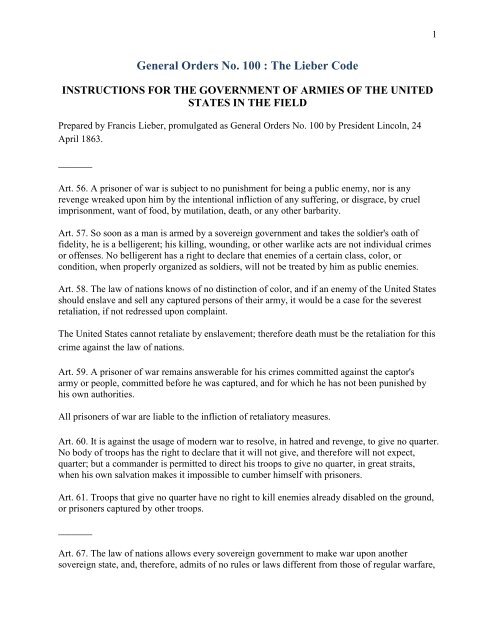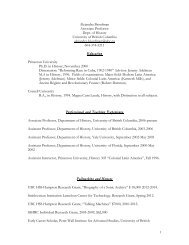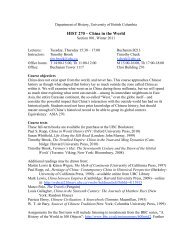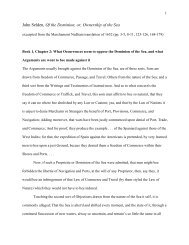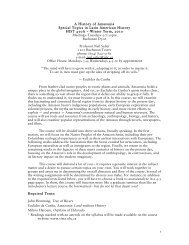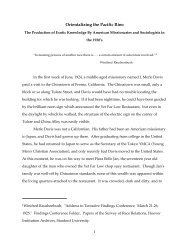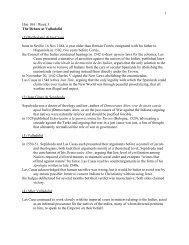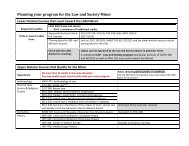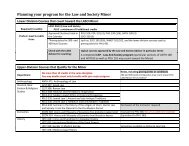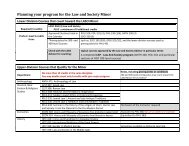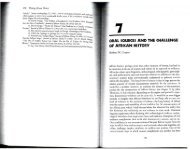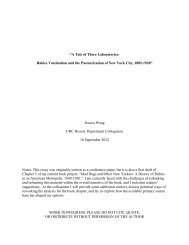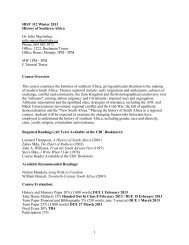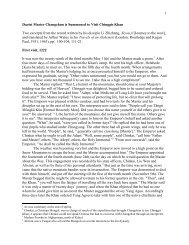General Orders No. 100 : The Lieber Code
General Orders No. 100 : The Lieber Code
General Orders No. 100 : The Lieber Code
You also want an ePaper? Increase the reach of your titles
YUMPU automatically turns print PDFs into web optimized ePapers that Google loves.
1<br />
<strong>General</strong> <strong>Orders</strong> <strong>No</strong>. <strong>100</strong> : <strong>The</strong> <strong>Lieber</strong> <strong>Code</strong><br />
INSTRUCTIONS FOR THE GOVERNMENT OF ARMIES OF THE UNITED<br />
STATES IN THE FIELD<br />
Prepared by Francis <strong>Lieber</strong>, promulgated as <strong>General</strong> <strong>Orders</strong> <strong>No</strong>. <strong>100</strong> by President Lincoln, 24<br />
April 1863.<br />
_______<br />
Art. 56. A prisoner of war is subject to no punishment for being a public enemy, nor is any<br />
revenge wreaked upon him by the intentional infliction of any suffering, or disgrace, by cruel<br />
imprisonment, want of food, by mutilation, death, or any other barbarity.<br />
Art. 57. So soon as a man is armed by a sovereign government and takes the soldier's oath of<br />
fidelity, he is a belligerent; his killing, wounding, or other warlike acts are not individual crimes<br />
or offenses. <strong>No</strong> belligerent has a right to declare that enemies of a certain class, color, or<br />
condition, when properly organized as soldiers, will not be treated by him as public enemies.<br />
Art. 58. <strong>The</strong> law of nations knows of no distinction of color, and if an enemy of the United States<br />
should enslave and sell any captured persons of their army, it would be a case for the severest<br />
retaliation, if not redressed upon complaint.<br />
<strong>The</strong> United States cannot retaliate by enslavement; therefore death must be the retaliation for this<br />
crime against the law of nations.<br />
Art. 59. A prisoner of war remains answerable for his crimes committed against the captor's<br />
army or people, committed before he was captured, and for which he has not been punished by<br />
his own authorities.<br />
All prisoners of war are liable to the infliction of retaliatory measures.<br />
Art. 60. It is against the usage of modern war to resolve, in hatred and revenge, to give no quarter.<br />
<strong>No</strong> body of troops has the right to declare that it will not give, and therefore will not expect,<br />
quarter; but a commander is permitted to direct his troops to give no quarter, in great straits,<br />
when his own salvation makes it impossible to cumber himself with prisoners.<br />
Art. 61. Troops that give no quarter have no right to kill enemies already disabled on the ground,<br />
or prisoners captured by other troops.<br />
_______<br />
Art. 67. <strong>The</strong> law of nations allows every sovereign government to make war upon another<br />
sovereign state, and, therefore, admits of no rules or laws different from those of regular warfare,
2<br />
regarding the treatment of prisoners of war, although they may belong to the army of a<br />
government which the captor may consider as a wanton and unjust assailant.<br />
Art. 68. Modern wars are not internecine wars, in which the killing of the enemy is the object.<br />
<strong>The</strong> destruction of the enemy in modern war, and, indeed, modern war itself, are means to obtain<br />
that object of the belligerent which lies beyond the war.<br />
Unnecessary or revengeful destruction of life is not lawful.<br />
Art. 69. Outposts, sentinels, or pickets are not to be fired upon, except to drive them in, or when<br />
a positive order, special or general, has been issued to that effect.<br />
Art. 70. <strong>The</strong> use of poison in any manner, be it to poison wells, or food, or arms, is wholly ar.<br />
Art.71. Whoever intentionally inflicts additional wounds on an enemy already wholly disabled,<br />
or kills such an enemy, or who orders or encourages soldiers to do so, shall suffer death, if duly<br />
convicted, whether he belongs to the Army of the United States, or is an enemy captured after<br />
having committed his misdeed.<br />
_______<br />
Art. 76. Prisoners of war shall be fed upon plain and wholesome food, whenever practicable, and<br />
treated with humanity.<br />
<strong>The</strong>y may be required to work for the benefit of the captor's government, according to their rank<br />
and condition.<br />
Art. 77. A prisoner of war who escapes may be shot or otherwise killed in his flight; but neither<br />
death nor any other punishment shall be inflicted upon him simply for his attempt to escape,<br />
which the law of war does not consider a crime. Stricter means of security shall be used after an<br />
unsuccessful attempt at escape.<br />
If, however, a conspiracy is discovered, the purpose of which is a united or general escape, the<br />
conspirators may be rigorously punished, even with death; and capital punishment may also be<br />
inflicted upon prisoners of war discovered to have plotted rebellion against the authorities of the<br />
captors, whether in union with fellow prisoners or other persons.<br />
Art. 78. If prisoners of war, having given no pledge nor made any promise on their honor,<br />
forcibly or otherwise escape, and are captured again in battle after having rejoined their own<br />
army, they shall not be punished for their escape, but shall be treated as simple prisoners of war,<br />
although they will be subjected to stricter confinement.<br />
Art. 79. Every captured wounded enemy shall be medically treated, according to the ability of<br />
the medical staff.


